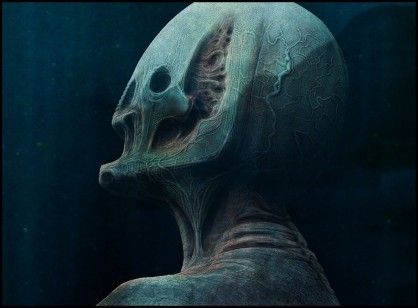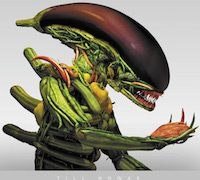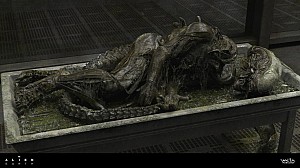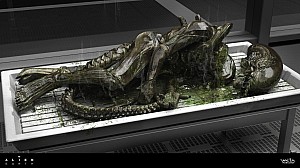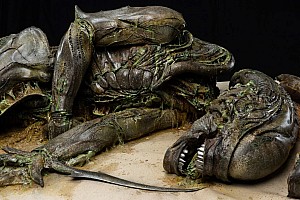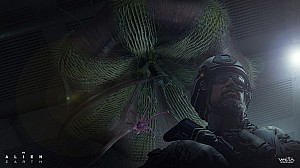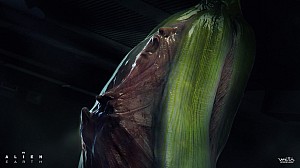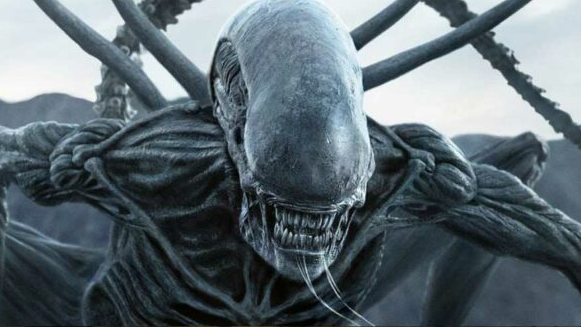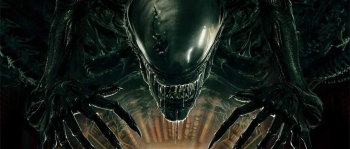Philosophy, Theories and Fun! (Sumerian)
Prometheus Forum Topic

QubedAtom111
MemberOvomorphJun 14, 20121889 Views8 RepliesDear Forum Mods:-
Please note I have added links as a source for material of relevance to my suppositions only for the purpose of plot surmising fun, thus it is my intention to provide something a bit more shall we say philosophical for fans to munch on.
I do not own any of the information quoted nor the websites nor do I affiliate myself with them, I have simply added references as best I could as I wish to link some relevant ideas together for those interested in the journey.
*laughs* Just to indemnify myself further, my grammar might not be perfect, please consider this took ages and it's just for fun and because I loved the movie, so please cut me a little slack if you can...
And here we go, strap your self in!
The 'Engineers' or giants, sat in a spaceship wearing a space suit (with a nose attachment) connected to a machine Chair in a C shaped space craft, please research the following real world prehistoric cultures for reference-
Lets say way above planet earth before earthlings were created, to seed life, to reproduce, to integrate there DNA with that of the parent planet, lets say fish, ("if you believe darwin's theory") or maybe just their (the Engineers) DNA alone makes no difference really.
When we first see an engineer it is standing alone on the edge of a huge waterfall with a massive disc shaped spaceship hovering above in the sky. We briefly see (Babylonian) Sumerian Cuneiform writing on the lid or cover of this Engineers ‘black goo drink’ -> so following the theme of destruction to creation (mentioned much later in the film by David the android) the Engineer having gulped down the black goo then ‘falls into 'the water’ appropriately a water-fall, as it does this we see it mutate and apparently dissolve. (this Cuneiform text differs from the text that David later activates inside the Engineers ship, is there a reason for this apparent discrepancy?
We shall see...
THE CREATION MYTHOS
The following articles may well seem besides the point, however if you don't mind that, and can temporarily suspend your believes (whatever variety those may take) then please read on with an open mind, er.. Just not too open or your head might explode *laughs*-
The Hongshan culture (simplified Chinese: 红山文化; traditional Chinese: 紅山文化; pinyin: hóngshÄn wénhuà ) was a Neolithic culture in northeastern China. Hongshan sites have been found in an area stretching from Inner Mongolia to Liaoning, and dated from about 4700 BC to 2900 BC
(a very advanced people who curiously build very oddly shaped and beautiful pyramids that were recently discovered)
Sources-
http://en.wikipedia.org/wiki/Pig_dragon
http://goo.gl/2Kn5A - Pretty pictures from google images of Pig Dragons.
Please read about K'inich Janaab' Pakal -
http://en.wikipedia.org/wiki/K'inich_Janaab'_Pakal
http://arcturi.com/AncientAliens/Pakal.html
Please read the following-
Maya creation myth - source given
http://www.bigorrin.org/archive108.htm
Contents are the sole property of the authors.
This article has been archived from the now-defunct Creation Myths site.
(http://www.amherst.k12.wi.us/USERWEBS/faculty/faculty/gorddebr/myths.htm) for educational purposes).
Maya creation myth
NOTE: The Mayas were an advanced people who lived in the area now known as Guatemala, Honduras, Belize, and the Mexican state of Yucatan, where their descendants now live. This story is from the Popol Vuh, the Mayan epic. It is both a Creation myth and a beautiful morality tale.
There were four gods in heaven and each of them sat on his chair, observing the world below. Then the yellow lord suggested that they make a man to enjoy the earth and offer praise to the gods. The other three agreed.
So the yellow god took a lump of yellow clay and made a man from it. But his creation was weak; it dissolved in water and could not stand upright.
Then the red god suggested that they make a man out of wood, and the others agreed. So the red god took a branch from a tree and carved it into a human shape. When they tested it in water, it floated; it stood upright without any problem whatsoever. However, when they tested it with fire, it burned.
The four lords decided to try again. This time the black god suggested making a man out of gold. The gold man was beautiful and shone like the sun. He survived the tests of fire and water, looking even more handsome after these tests. However, the gold man was cold to the touch; he was unable to speak, feel, move, or worship the gods. But they left him on earth anyway.
The fourth god, the colorless lord, decided to make humans out of his own flesh. He cut the fingers off his left hand and they jumped and fell to earth. The four gods could hardly see what the men of flesh looked like as they were so far away. From the seat of the four lords, they looked like busy little ants.
But the men of flesh worshipped the gods and made offerings to them. They filled the hearts of the four lords with joy. One day the men of flesh found the man of gold. When they touched him, he was as cold as a stone. When they spoke to him, he was silent. But the kindness of the men of flesh warmed the heart of the man of gold and he came to life, offering praise to the gods for the kindness of the men of flesh.
The word of praise from the previously silent creature woke the four gods from their sleep and they looked down on earth in delight. They called the man of gold "rich" and the men of flesh "poor," ordaining that the rich should look after the poor. The rich man will be judged at his death on the basis of how he cared for the poor. From that day onward, no rich man can enter heaven unless he is brought there by a poor man.
Next we jump to ancient Sumer..
Absu: Babylonian, god of the underwater ocean, please see the ancient 'Epic of Creation - Enuma Elish'
THE FIRST TABLET
When in the height heaven was not named,
And the earth beneath did not yet bear a name,
And the primeval Apsu, (water) who begat them,
And chaos, Tiamut, (Serpent or reptile if you like)
("I think we have some kind of reptile like lifeform here sir")
the mother of them both
Their waters were mingled together,
And no field was formed, no marsh was to be seen;
When of the gods none had been called into being,
And none bore a name, and no destinies were ordained;
Then were created the gods in the midst of heaven,
Lahmu and Lahamu were called into being...
Ages increased,...
Then Ansar and Kisar were created, and over them....
Long were the days, then there came forth.....
Anu, their son,...
Ansar and Anu...
And the god Anu...
Nudimmud, whom his fathers, his begetters.....
Abounding in all wisdom,...'
He was exceeding strong...
He had no rival - well almost..
Please note carefully at which points this ringed planet appears in the film.
The crews uniform badges, depict the ringed planet-
Related filmic onscreen moments-
Data Cube,
Silver Cross,
60 60 60 61 61 61 62 62 62
60 60 60 61 61 61 62 62 62
60 60 60 61 61 61 62 62 62
Bio weapon shells, with an earth based atmospheric trigger intended for earth! The engineers have a 100% DNA match with humans, they breath the same air, the atmosphere of the development planet would not trigger the weapon, but the atmosphere of the ship would.
DNA modification-
What seems to be the Engineers gender? Male? Female?? or Androgenic– much like David the vain android, who models himself on Peter O’ Tool, also Androgenic if not slightly camp, the repressed Lawrence of Arabia, a blond intelligence agent of the British Empire and outsider who successfully infiltrates hostile Arabian territory forces to raise a Beduin army against the Turks during WWI.
David displays psychopathic tendencies, see the Film Lawrence of Arabia-
“You’ll do that once too often, It’s only flesh and bloodâ€
"MJH your a philosopherâ€
“And your balmyâ€
“Oh that hurts!â€
“Certainly it hurtsâ€
“Whats the trick then?â€
“The trick is not minding that it hurtsâ€
“HE’S BALMY!â€
The android is defective emotionally, he has psychopathic tendencies, (this is confirmed by Ripley in Aliens) but because of his programming (see first law of robotics) he must elicit tacit agreement before administering the alien BioWeapon he covertly took from the shell shaped container holding the vile or ampules)
Interestingly the devil is also often described or depicted as a reptile, serpent or dragon, who rather then confront what is virtuous must also seduce (illicit tacit agreement). See 'Ordo Virtutum' Part II from the 'Symphonia armoniae celestium revelationum’ the earliest morality play by more than a century, where the devil seduces her away to worldly things, or in this case with other worldly things via her lovers seduction.
The android as we know was following company orders, old man Wayland wants MORE TIME, but fails to grasp even when warned that this would lead to nothing but death. (the space building in the background of the black cube presentation featuring old man Weyland are a nod to Buckminster Fuller)
The Engineers (or maybe we should call them giants)
The Nephilim were on the earth in those days… for more info on the Giants of old please see
http://bible.cc/genesis/6-4.htm
A highly relevant excerpt from a pertinent interview with Director Ridley Scott-
"Darwinism seems to be logical," Scott says, launching a long trajectory of a response. "You come from something on all fours, to something that stands upright and gathers fruit from trees, and then realizes that it's a lot more convenient to walk upright, so now you have Homo sapiens.
“Ape-to-man, it makes sense — you can even look at the drawings and the diagrams of why it makes sense. And I don't think that God touched a rock and suddenly there was man. It's not that simple.
“But I'm still a product of my childhood, where I was obliged to be an altar boy and sing in the church choir. … it was forced upon me as a process … but when I managed to wiggle out of it, there were two things left, very strong things which are indelible and will stay with you forever, and that is guilt, and a sense of right and wrong. And one drives the other. … “So, I can't shake it, dammit, and Mummy's not even there to actually tell me off any more, right? But it's strong, it's powerful. And is it the best confidence trick ever put to mankind, or is it real?
“Because there's enough religions in this world now, and different holy books and denominations, and yet they all tend to worship one god. And therefore you can argue that that one god is The God. And ironically, it creates more problems, and causes more bloodshed, than anything else that we can possibly think of.
“So, you do wonder, is there a grand designer? And does he allow us to fight it out? It's as if he told five or six kids to go into the backyard and beat at each other and see who's left standing."
Prometheus, set in the last decade of the 21st century, throws another theory into the mix: pre-visitation. Maybe we were created by aliens from another solar system?
"It was a popular notion in the late 1950s," Scott, 74, explains. "Erich von Däniken was one of its proponents. … Now that all seems hippieish, Age of Aquarius and a lot of marijuana, but as we advance into the 21st century, science is evolving at a quantum pace. And actually, as it draws back and reveals more, it also reveals once again how little we know."
In Prometheus, before the ship's crew is rousted from three years of hypersleep, Fassbender's robot, David, has the place to himself. He rides around on a bike, shoots hoops, watches old movies. One of those is Lawrence of Arabia, David Lean's epic about the British adventurer and World War I hero T.E. Lawrence.
Why Peter O'Toole and Lawrence of Arabia, we want to know?
"There's a logic to all of it," Scott replies. "If I'm going to be a housekeeper on a ship, but I don't need to sleep — and we're not going to hide the fact of what he does and what he is and how he came about — then he needs to occupy himself. We're told fairly quickly that this is a robot, OK?
“And he is a savant, clearly. He has a 300 IQ, you can hand him a telephone book and ask him to read half of it and he will start reciting it. At the same time, he would go in for forms of human entertainment. He would have read everything in [Prometheus'] digital library, he would have seen everything. Four million digital films that go way back to God knows when. … And the thing he most engages with is a person that looks a little bit like him, like Peter O'Toole.
“So now you've got Lawrence, and he's obsessed with Lawrence, and he dyes his hair and starts to mimic him, and that's how that comes about."
now given all this you may as well read the following-
Though like fish and chips perhaps you should take it with a pitch of salt-
http://www.theosophy-nw.org/theosnw/science/sc-jvm1.htm
Prometheus and Darwin
By John P. Van Mater
Out of the deeps of space galaxies emerge, ablaze with the lights of countless worlds. One such world is our sun with its family of planets. And this tiny earth, our home, has seen the birth of man and his brothers of all the kingdoms.
Scientists have been pondering this genesis, starting with the premise that life, so called, sprang from nonlife through a series of complex chemical combinations, organizations of matter (and organizations of organizations), until the whole panorama of the kingdoms was unfolded, climaxed by the appearance of thinking, self-conscious man. We have on the one hand organic matter, the "living" kingdoms vegetables, beasts, and men. All else, by scientific definition, is inorganic, lifeless, that is to say, the great solar orb is a majestic astrophysical phenomenon, nothing more, which by a kind provision of "nature" pulses forth energies titanic enough to cross vast space and nourish earth's tender "life." But the sun itself is not living, nor is this rocky lump we call earth; or the billions of fellow suns that look down upon us from the night sky -- or the great disc of the universe itself, wheeling its way across seemingly infinite space, along with countless other universes.
Perhaps because of the overwhelming prevalence of this scientific philosophy, little genuine attention is given the fact that the greatest minds of the past have also considered how worlds are born and how our life here has reached the point where man's intelligence can probe the ultimate cause of his own being. These "other" explanations have somehow been made to appear alien to our modern outlook, as though only in our time have we attained a clear insight into realities. Yet surely there is more to universal nature than the outer shell that science explores.
How time erases the past! The surge and resurge of empires brings now this race, now that to cyclic prominence, often obliterating the achievements of conquered folk, so that with the next flow of conquest even their names become legendary -- consult the list of allies of Troy and Greece in the Iliad. But races have a lore that survives the evanescent life of states. In the area of philosophy and religion there often remain lofty epics, myths of creation, stories of wars. These are usually woven into accounts that have historical value for they are, after all, the memory of the race. And mixed with these landmarks, whether of Troy, Babylon, or the Plain of the Kurus, are symbolic accounts of genesis, the birth of worlds, the origin of man. These scriptures and epics are first handed on by oral tradition, bridging eras of turbulence when any sort of writing had perished; but are finally set down, usually grandly, in later times -- the Mahabharata, Kalevala, Iliad, and Eddas, the Puranas of ancient Aryavarta, the Gilgamesh epic of Sumeria, the Babylonian Genesis, and hosts more. Whereas the names employed by the various ancients may differ, the settings also, they all ask the same searching questions: How was our world born? Whence came the kingdoms of life? How did man achieve his self-consciousness? It is this last topic we seek to explore: man's self-conscious mind, that instrument which allows him to speculate upon his own nature and that of his world.
The main thrust of the old mythological tales is that early humanity did not "evolve" civilization by trial and error, but was taught it by godlike forerunners. To make this thought more understandable, we have to go behind the veil of secrecy and the panoply of ritual and seek the true intellectual framework prevalent among the ancients. For one thing, they believed in reimbodiment or reincarnation, in the concept that evolution is an individual concern, not national or racial except incidentally. In any life a person is what he has made of himself in former lives. He is drawn to incarnate now here, now there, to work out old causes, to reap the harvest of past sowings together with those with whom he had previously sowed. The central concept was that man has within godlike potentials, and in the course of many incarnations he is afforded innumerable opportunities to bring these forth -- as have the wisest and most compassionate figures of human history.
Once admit the possible existence of this enduring element in man, however, and we must allow the same spiritual individuality to all creatures and even things unless we assume that man is unique, all other lives being but temporary sparks of awareness that cease when the body dies and exist no more. But, if so, we would then have to explain where the enduring part of man came from. It is logically more consistent to hold that all units are alive, even the worlds in which we live and move. This was the reasoning behind the ancient panorama of gods and goddesses immanent in the cosmos, hierarchies of them "above" ourselves. And we cannot stop there; we must consider those kingdoms or universal activities "below" the so-called living kingdoms, the forces and energies which are the fuel-stuff of life itself. These too have been looked upon as lesser lives from most ancient times by peoples the world over. This, then, was the archaic picture of the universe, infilled with living suns and planets, within which coursed an infinite variety of sentient life on many levels or degrees of unfoldment; all parts of a process of cosmic evolution through repeated reimbodiments.
Generally speaking, however, our mental outlook is not conditioned to understand how or why the ancients set forth their history as they did, or to accept these fragments as legitimate interpretations of the same story that scientists describe in other terms. As with former eras where the thought life was dominated by a prevailing view, religious or scientific, we have the notion that it is only in our time that we have put aside our superstitious origins -- peopled as it was with hosts of gods and demons -- and emerged into the bright sunlight of a true perspective. We forget that even recent history urges us to rise above the egotism of current dogmas. Among our forebears of olden times were men and women as intelligent as we are. In their often secret schools they undoubtedly discussed the very topics that engage modern researchers -- Plato in his Academy, Plotinus in the Alexandrian School, and other enlightened figures in numerous centers in the Near East, India, and the Orient.
The mystery of man's self-conscious mind is a good subject to illustrate how science and the ancient traditions can be combined to give more profound interpretations. Little special emphasis is placed by science upon how man attained self-awareness, yet it was a truly spectacular achievement. It is presumed (without going into details) that man's supply of inner endowments accumulated step by step with his outer development. The modern view assumes that man, like all creatures, gradually acquired abilities and that these through long evolution became the refined inner qualities that distinguish the human species. But if man had sought only those features that would equip him to survive in a given environment, how account for the extraordinary development of his brain and his aesthetic and religious attributes and longings which are and, as far as can be determined, have always been present? This difficulty is currently sidestepped by the concept that genetic mutations explain how descendants may become endowed with capacities that do not necessarily spring from their contact with environment. And so, with an airy wave of the hand, we are led to believe that we can disregard any metaphysical explanations about man.
Almost at the outset, however, Darwinism had its critics among the scientists themselves, as the late poet-scientist Dr. Loren Eiseley points out in several of his books. He discusses the views of Alfred Russel Wallace, co-discoverer of the theory bearing Darwin's name. As early as 1864, Wallace claimed that man's evolution took place in two stages. Phase one had to do with the evolution of his body, which has remained fairly stable. The second phase was the arrival (or awakening) of the human mind, which introduced a wholly new factor into evolution. With thinking man, bodily specialization, he claimed, became outmoded, for environment no longer gripped him. But his brain, meanwhile, underwent astonishing changes. While the surrounding animals were producing extensive physical modifications, man's "skeleton has remained nearly stationary . . ." The human race "has been evolving mostly in the head." -- My Life: A Record of Events and Opinions, vol. I, p. 419.
Wallace's study of so-called primitive peoples led him to observe that they are in fact not primitive at all insofar as what would today be termed their genetic endowment. In the modern world we see countless examples of individuals who leap from their "savage" background of a generation or two ago and take their place intellectually, culturally, and aesthetically in our universities and in "civilized" society. But this is only an outward fact hiding an inner truth that has not been squarely faced: if these peoples have existed for untold ages in often primitive or barbaric environments, how explain their genetic potential? This is not something acquired overnight but needs countless millennia to implant under the step-by-step Darwinian process. And in this area they are not primitive in the least, having the same endowment we all have and needing only the proper environment to prove the fact. It is obvious that due to the cyclic rise and fall of races, nations, and tribes, there are times of power and ascendancy, and intervals (that may endure for centuries) when peoples seem to lie fallow until the call of circumstance awakens them to another more active destiny.
The explanations given by peoples of former times parallel in many respects the two-phase theory put forward by Wallace. They held that the human race spent countless ages developing an appropriate vehicle for its inner powers. At this point man was but an unthinking shell living a Garden-of-Eden existence. The time arrived, however, when this vehicle was ready, and higher beings, man's higher self in fact, incarnated in him, quickening, waking to self-consciousness his slumbering mind. These Manasaputras ("sons of mind," Hindu), Elohim (Hebrew), Prometheus (Greek), Loki (Norse), Ahriman (Persian), or whatever name or names peoples may have given them, were the rebellious Angels (Lucifer) who brought the fire of the gods to man. Tradition also has it that gods incarnated to teach the arts and sciences to Adam (mankind), so recently "cast out of Eden." These great ones, it is said, remained as the Divine Kings of universal legend, finally withdrawing as material cycles advanced, not however without founding the Mystery Schools where the archaic lore could be preserved and expounded -- thus forming for the intuitive mind the esoteric background that pecks out beneath the symbols and parables of the exoteric or popular mythologies coming down to us.
The myth of Prometheus is remarkably suggestive of these forgotten incidents in our past -- incidents which philosophers, poets, and dramatists of former eras elaborated in their descriptions of the birth of worlds and men. The story has taken several forms. In one version Prometheus created man out of the earth, in which there still resided "heavenly seeds" and, further, invoked the winds to breathe life into him. But man was still without fire, which many believe referred more to the fire of mind than to earthly fire. So Prometheus stole the fire of the gods and brought it to man hidden in a hollow reed. He also remained to teach mankind the arts and sciences. For these acts he was banished by Zeus, chained to a rock on Mount Caucasus, where an eagle preyed upon his liver; but he was eventually freed by Hercules, who can be taken to represent god-man or man perfected. One interpretation is that man's spiritual nature (Prometheus) is chained by its incarnation in man until man himself becomes consciously godlike (Hercules) and can set it free. The Christian story, although couched differently contains the same basic elements: Lucifer (literally, "lightbringer") is thrown out of heaven, but appears in Eden to tempt man with the fruit of the Tree of Knowledge. Corresponding myths may be found in nearly every part of the world.
Now if indeed the human race received such a spiritual-intellectual stimulus, surely we should find physiological evidence of this fact. One clue, presently downgraded but commented upon favorably by Dr. Eiseley, is that the human individual in his growth from conception to birth to adulthood reveals in the small what the human species has undergone in the large. In his Immense Journey, he notes the interesting fact that the human brain at birth is only slightly larger than that of a baby gorilla (330 cc); but in the first year of life the child's brain trebles in size. There is no parallel to this phenomenon anywhere in the animal world. Eiseley wonders "at what point in time or under what evolutionary conditions" did our human ancestors begin their remarkable transformation. Certainly the ancient tradition of the incarnation in man of higher intellectual qualities and the subsequent nurturing of infant mankind by more advanced souls, would have produced extraordinary changes. The rapid growth of his brain is evidence that something of this nature must have taken place. He refers to the "old biological law" that the development of the individual reflects the history of the race, which would confirm this "sudden or explosive increase" somewhere back in the prehistory of mankind.
Wallace supports this by pointing out that after man's brain had been prepared "there occurred the spiritual influx which alone enabled him to begin a course of intellectual and moral development (Social Environment and Moral Progress, p. 30)." He also asserted (to Darwin's disappointment) that the artistic, musical, and mathematical abilities of man could never have been evolved by natural selection and the mere struggle for existence.
If we assume that nature, the cosmos, is as real spiritually as it is tangible physically, the ideal philosophy describing it would have to illuminate both worlds. And since we cannot in ourselves discover where body ends and spirit begins, we should not try to divide and separate the realm of science from that of religion, but allow the insights of each to penetrate the other. What we seek, after all, is not material truth or spiritual truth, but the actual truth -- as far as we humans can perceive it. And there is no other subject, perhaps, that lends itself so aptly to a universal outlook as the mystery of man's self-conscious mind. For mind partakes of both worlds: it is housed in a brain, but wings its way unfettered by physical chains, touching the stars with its immediate glance, but in the next moment pausing hesitantly over the immensity of a flower.
(From Sunrise magazine, November 1979. Copyright © 1979 by Theosophical University Press)
My apologies for the devilishly lengthy posting, ho ho ho… *devilish grin*
Well I trust this sheds some light on matters, now I really must finish reading the rest of that phone book and purchase some vinegar for my non existent fish supper, or perhaps I shall choose the squid… mmmm tentacle anyone?
If anyone cares to elaborate on the themes explored please feel free.. (you too Sir Riddly *wink wink*)"
Are you an avid Alien fan looking for a dedicated online community of likeminded fans? Look no further! Create your own profile today and take part in our forums and gain XP points for all the content you post!




